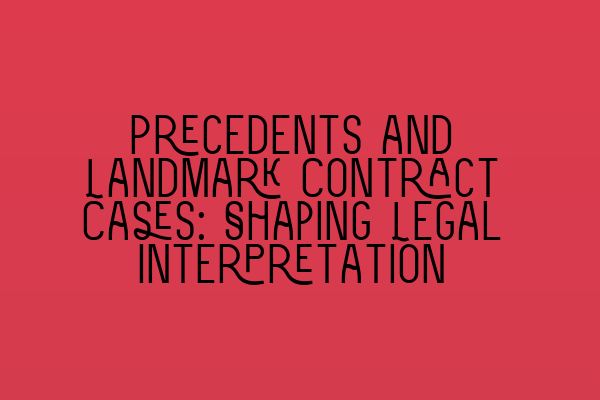Precedents and Landmark Contract Cases: Shaping Legal Interpretation
As a solicitor, understanding precedents and landmark contract cases is essential to providing effective legal advice and representation to clients. Precedents, also known as case law, are decisions made by courts that establish legal principles and serve as a guide for future similar cases. These cases play a pivotal role in shaping legal interpretation and establishing the rule of law. In this article, we will explore the significance of precedents and discuss some of the landmark contract cases that have had a profound impact on contract law.
The Significance of Precedents
Precedents are the building blocks of our legal system. They provide consistency, predictability, and fairness by ensuring that similar cases are treated similarly. When a court makes a decision in a case, it becomes part of the body of law known as common law. Other courts then use these precedents to guide their own decisions in similar cases, creating a system of legal interpretation that is rooted in consistency and fairness.
By establishing legal principles through precedents, the courts provide guidance not only to other cases, but also to individuals and businesses who need to understand their legal rights and obligations. Precedents help create a sense of certainty and stability in the law, as they provide a framework for legal interpretation that is based on previous rulings and established legal principles.
Landmark Contract Cases
There have been several landmark contract cases that have significantly influenced contract law and shaped legal interpretation. These cases have set important precedents and established principles that continue to guide courts in contract-related disputes. Let’s take a closer look at some of these influential cases:
- Bates v. Post Office Ltd [2015] UKSC 14: This landmark case dealt with the interpretation of contractual terms and the duty of good faith. The Supreme Court held that there is an implied duty of good faith in contracts, and that the Post Office had breached this duty in its dealings with sub-postmasters.
- Investment Trust Companies v. Dominion Insurance Co [2008] UKHL 4: In this case, the House of Lords clarified the principles of contractual interpretation. The court emphasized the importance of interpreting contracts in a way that gives effect to the parties’ reasonable expectations, and rejected a more literal approach to interpretation.
- Transfield Shipping Inc v. Mercator Shipping Inc [2008] UKHL 48: This case involved issues related to the interpretation and implication of terms in contracts. The House of Lords held that terms will only be implied in a contract if they are necessary to give the contract business efficacy or are so obvious that it goes without saying.
These landmark cases illustrate the importance of proper interpretation of contractual terms, the duty of good faith, and the implication of terms. They serve as valuable precedents that continue to guide courts and legal professionals in contract-related matters.
Conclusion
Precedents and landmark contract cases play a crucial role in shaping legal interpretation and establishing the rule of law. By providing consistency and guidance, precedents ensure that similar cases are treated similarly and help create a sense of certainty and stability in the law. Understanding these precedents is essential for solicitors to provide effective legal advice and representation to their clients. If you want to learn more about the legal profession, check out our related articles:
- Barrister vs. Solicitor: A Comprehensive Comparison
- Exploring Different Solicitor Specializations: Finding Your Niche
- Embracing the Rise of Virtual Law Practices
- Navigating the Maze: Demystifying Ethical Responsibilities of Solicitors
- Unveiling Real-Life Case Studies: Insights into Legal Practice and Decision-Making
By exploring these topics, you will deepen your knowledge of the legal profession and gain valuable insights into various aspects of legal practice.
